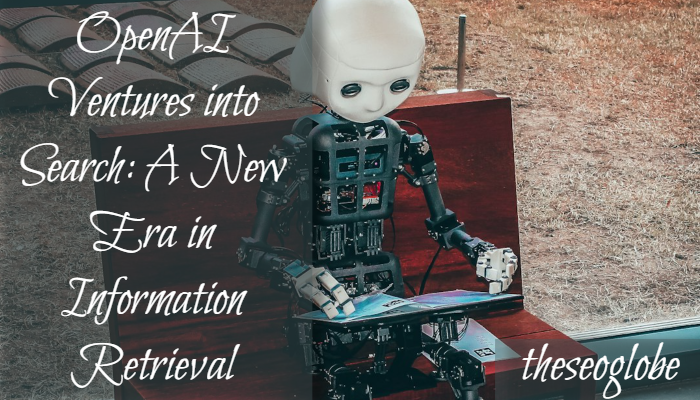Open AI after a revolution in writing and graphics is coming up with an information retrieval mechanism. Know all about OpenAI Ventures into Search and how it will impact society!

In a step towards fundamentally reshaping how people interact with digital information, OpenAI has declared that it is creating a cutting-edge search product. Being in front of artificial intelligence technology, the transition is all the more exciting for its prospect of harnessing the power of state-of-the-art AI to provide users with a searching experience that is smarter and more intuitive. This comprehensive investigation will clarify what exactly OpenAI’s search product is, explain how OpenAI’s offering differs from existing technologies, and what that means for the future of search in general.
Background: OpenAI’s AI Expertise
OpenAI was founded as a research organization to promote and develop friendly AI so that it works for the benefit of humanity as a whole. It is pioneering new breakthroughs in regard to AI. From natural language processing to generative text models, OpenAI has been pushing boundaries on what AI can achieve. The entry into this space of developing a viable search engine. It was just one more leap toward their mission of democratizing AI technology so that information becomes universally accessible and useful.
Features of OpenAI’s Search Product
- AI-Powered Understanding
This would infuse advanced natural language processing capabilities, like those represented by models such as ChatGPT, into the very heart of OpenAI’s search engine. This would mean the ability to make inferences beyond the literal meaning of texts in searches and, in doing so, allow the systems to understand context and subtleties, ultimately presenting answers aligned with user intention.
- Personalized Search Experience
By doing so, this search product with AI integration can learn the preferences and search patterns of users, facilitating a truly personalized experience. In the end, such an adaptive learning approach can make searches relevant and tailored, making it in complete contrast to the one-size-fits-all results common with traditional search engines.
- Enhanced Data Privacy
OpenAI will prioritise the privacy of the users by protecting the personal data that enhances search experiences. By using advanced encryption and anonymization techniques, it will protect the information of any user using the search product and simultaneously set a new standard in privacy.
- Integration with Other AI Tools
It is integrated with all other AI tools and platforms, leveraging efficiency and functionality. From improved academic research and data analysis to well-refined creative projects edited with better ideas, the search product from OpenAI provides a comprehensive tool designed for much more than ordinary web searches.
How It’s Different from Other Search Engines
Unlike commonly used conventional search engines that majorly catalogue and retrieve based on keywords. OpenAI’s product would comprehend the intent and context behind those searches. Such an approach would considerably bring down the search for irrelevant info. Therefore, much more enriched and engaging results for the user. Besides, OpenAI’s search engine will be guided by the principles of ethical AI usage to deal with these growing concerns regarding AI bias and misinformation, and hence safeguard balanced and fair information dissemination.
What It Means for Business and Consumer
For Business
In the case that OpenAI’s search product wins the dominant standard for business intelligence. It will have far greater precision on business market insights, consumer behaviour predictions, and competitive analysis tools will be presented. Businesses will be able to adjust their strategic planning, marketing, and service response based on such data that is tailored.
For Consumers
For the average person, this would mean faster and more relevant searches. Such a thing gets an individual closer to all their needs and contexts. It could dramatically change the way we learn, decide, and communicate. In the digital world, OpenAI is finding ways to navigate these seas of big data.
Challenges and Considerations
While the promise is vast, there are challenges. The accuracy of AI in understanding complex human queries, handling different languages and dialects, and the ever-present concern of the digital divide is amazing. Moreover, ensuring equitable access to this advanced technology, are some hurdles OpenAI will need to address.
OpenAI ventures into search is not an expansion of its portfolio but a redefinition of search paradigms. While OpenAI develops this possibly new tool with an ethical AI, it is pioneering the future. A place where AI will work more closely with human beings towards knowledge discovery and information utilization. As we go into the future, this search engine is likely to become a keystone of how we are going to experience the Web. The aim is to turn queries into conversations and searches into dialogues.
Also Read: Google and AI-Generated Content: Details, Google Guidelines and AI Content Detection Tools

